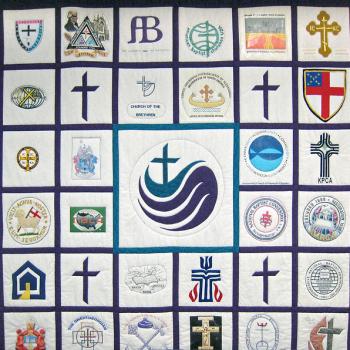Some Christians feel closer to God when they are happy (and if they aren’t, they often feel that there is something wrong with them spiritually). Other Christians feel closer to God when they are hurting or struggling. Those with the sunnier religious experience have been called “Summer Christians.” Those with the darker experiences of God have been called “Winter Christians.”
This distinction may have some affinity with Luther’s “theology of glory” vs. “the theology of the cross,” but it seems to be more a matter of temperament. But in today’s climate, “Winter Christians” may well feel themselves written out of the church. After the jump, some links to the subject, including a study of how today’s pop Christian music is nearly always oriented to Summer Christians, while Christian music of the past deals with darker, more wintry themes.
Thanks to Alexi Sargeant for introducing me to the distinction in her post Songs of Exile at First Thoughts.
From Leah Libresco, The Sun Is Always Shining In Modern Christian Pop | FiveThirtyEight:
I took a look at the last five years of Billboard’s year-end top 50 Christian songs to see whether Christian pop is unrelentingly cheerful. I looked at pairs of concepts across the entire collection of lyrics (life and death, grace and sin, etc.) and calculated the ratio of positive to negative words. For every pair I checked, positive words were far more common than negative ones.
There were 2.5 times as many mentions of “grace” as “sin” in the songs’ lyrics. Other pairs were even more lopsided: There were more than eight mentions of “life” for every instance of “death,” and “love” was more than seven times as common as “fear.” (For the record, 1 John 4:18 — “perfect love casts out fear” — is advice for spiritual formation, not lyrics writing.) Parishioners may find too much positive language dispiriting. When Christian pop songs and hymns are “excessively positive or wholly positive,” they often “come across as cotton candy and inauthentic,” said Richard Beck, a psychology professor at Abilene Christian University and the author of several books on the intersection between theology and psychology.
But Christian music hasn’t always been so one-note. I wanted to compare the sentiments of modern songs with those of an earlier tradition of American Christian music: shape note. Shape note was the popular music of its day, according to filmmaker Matt Hinton, a former religion professor at Morehouse College and the co-creator of “Awake, My Soul: The Story of the Sacred Harp,” a documentary about modern shape-note singers. Shape note is named for the way the sheet music is written, using shapes to make sight-reading easier. It was commonly sung across the American South in the mid-1800s and is still sung today by a mix of Christians and folk-music enthusiasts.
For most of the pairs of concepts, the shape-note hymns also had more positively associated words than negative ones, but the shape-note songs aren’t as unremittingly positive as the contemporary songs.
Hinton sees the darker themes of shape note as integral to Christian worship. Mixing in negative language makes it easier to tell the positive story of salvation, Hinton said. He sees shape-note texts as placing “a profound emphasis upon grace.” And because of that emphasis on grace, “there’s an emphasis on the reality of sin,” Hinton said.
Beck agrees and identifies one group of Christians who are particularly poorly served by uniformly upbeat themes in worship: “Winter Christians,” a group that Beck describes as having a relationship with God that is more touched by pain, distance or doubt. They can’t recognize themselves in the “Walt Disney-fication” of contemporary Christian music, Beck said, and when their experiences with Christianity aren’t reflected in hymns, they tend to assume that there’s something “wrong or diseased about who they are.” But Winter Christians aren’t alien to Christianity, Beck said: The Bible’s psalms of complaint reflect their struggles.
[Keep reading. . .]
For a summary of Richard Beck’s work on the subject from a few years ago, including citations to his publications, see Summer and Winter Christians.
















